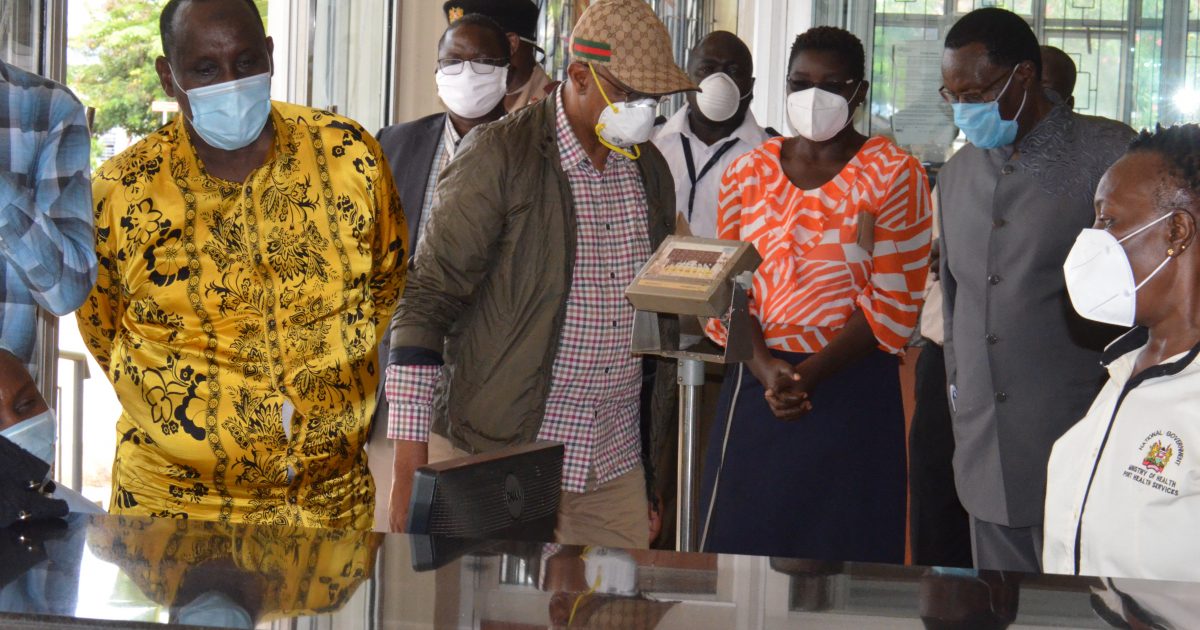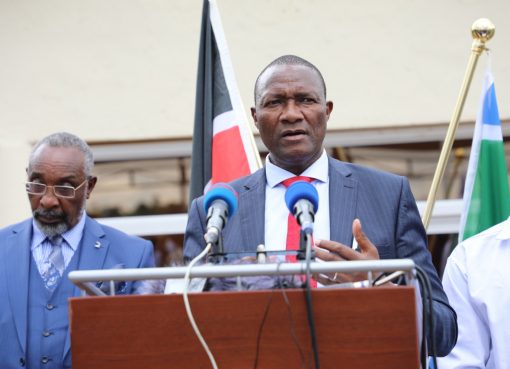On Monday afternoon as Tanzania government was announcing an alarming surge of 84 more Covid-19 confirmed cases, a Kenya Police helicopter was circling in Taveta skies in preparation for landing at a deserted Taveta airstrip. Aboard were three top government officials; Hussein Dado, Dr. Rashid Amani and Chris Obure-Chief Administrative Secretaries CASs) for Ministry of Interior, Health and Transport respectively.
After landing, the CAS’s exchanged curt pleasantries with a dozen senior national government and top security officials waiting to receive them. The entourage left quickly for a meeting at the One-Stop-Border-Post (OSBP) facility at the Kenya-Tanzania border in Taveta. Their grim faces and rigid bearing betrayed the gravity of the CASs` mission at the border county.
At the meeting, Mr. Dado, the CAS Interior, was brief. “We are here to check on compliance with the border closure directive and measures put in place to protect our border in relation to Covid-19,” he said.
That a high-powered delegation flew to Taveta-Holili border at a time when both air and ground travel are heavily restricted underscores the critical concern the government has over security along this porous border as Covid-19 continues to relentlessly eviscerate economies and communities around the world.
The visit further points to unspoken but mounting apprehension by Kenya over the galloping Covid-19 cases being reported in Tanzania. Chief amongst the concerns are fears that if the border is poorly manned, the surging numbers might eventually spill over to the Kenya side. This is a situation the government wants to avoid at all costs.
Mr. Dado noted that although member states of East African Community (EAC) were cooperating closely to halt the spread of this deadly pathogen, each country had adopted a different public-health protection regime.
“We are cooperating. However, each country has devised a different approach in protecting her citizenry. Some have taken seemingly radical steps while others have not,” he said.
Kenya, with close to 300 covid-19 cases, is amongst EAC states with drastic measures to stop coronavirus community-transmission. Such measures include 7pm-5am curfew, closure of schools, banning of religious gatherings, mandatory face-mask wearing in public and partial lockdown of counties with high cases of Covid-19.
Countries like Rwanda, Uganda and Burundi have also imposed curfews and restricted gatherings to contain transmission hotspots. In Tanzania, though schools were closed, churches are still operational and movement of people and goods are going on normally.
Alarming disclosure that Covid-19 cases in Tanzania surged from 147 to 257 within three days shows that the government has every reason to worry over the risk posed by the border shared by the two countries. If unchecked, the zone will easily become a flashpoint of inter-country transmission.
In her status report, the County Commissioner Rhoda Onyancha said Taita-Taveta County did not have a single Covid-19 case. She stated that surveillance has been enhanced at border to curb illegal crossings adding that after the ban of movements through the One-Stop-Border-Post, only truck drivers with essential commodities were being cleared to pass by border management agencies.

“We have ratchetted up our surveillance and the efforts are yielding fruits,” said the administrator.
However, she admitted that border porosity remained a headache even as sporadic reports of border-crossing in some remote villages trickled in. Such villages include Madarasani, Njukini, Lessesia, Challa, Jipe and Kitoghoto.
Patrols and surveillance aside, Ms. Onyancha said the most potent weapon deployed to seal the illegal border routes is the extensive NyumbaKumi. Security network that extends the breadth and length of the 110-km of Kenya-Tanzania border.
She noted that because intelligence-gathering and information-sharing is central in stopping illegal crossings, border communities had been incorporated as part of active security network to monitor and report movements especially in the far-flung villages where police patrols cannot easily access.
“The NyumbaKumiis are actively assisting in thwarting illegal crossing. They report whenever any foreigner is seen on the Kenyan side,” she said.
The police response time to such incidents had also improved with cases being responded to between instantly and fifteen minutes based on the site where the report was made.
The strategy is bearing fruits. On Sunday, police arrested two Tanzanians after a tipoff from public. The two will be in a quarantine for 14-days. However, it is not only border movement monitoring that has transformed NyumbaKumi security initiative into a prime vanguard against the spread of Covid-19 at grassroots level.
The village security networks have also become instrumental in enforcing government directives for the communities. After the County Emergency response team issued directives for all visitors from counties with covid-19 cases to self-quarantine for 14 days, the NyumbaKumi networks became the local enforcers of that directive.
“They even organised how the people in quarantine would get food and other requirements,” said the county commissioner.
A visitor from Mombasa who was to self-quarantine in Taveta town last week escaped a physical beating after he was sighted at the market. NyumbaKumi networks rapidly mobilised the members and rushed the shaken man back to his house with stern warning to him not to violate the quarantine period.
Such efforts have not got unrecognised. Mr. Hussein Dado said he was vastly impressed with the strategy that places community at the centre of enhancing border security.
“We leave here with good reports. World over, border communities remain a challenge and bringing them on board to support surveillance is very commendable,” he said.
Formulation and execution of such strategies is not by chance. In August last year, Ms. Onyancha was amongst dozens county commissioners from border counties attending border-security training by USA’s elite Customs and Border Protection (CBP) in Arizona. The training had envisaged situations where unregulated border crossings and illegal activities like smuggling and influx of illegal immigrants would pose a grave threat to a country.
To effectively combat such threats, the training insisted on incorporating border communities to enhance security.
“They are our eyes and ears. We made them know anything dangerous coming through will land in their homes first,” she added.
However, despite such plans, public health experts are calling for more caution.
Dr. Rashid Amani, CAS for Health, said the government should not relent because the country was not out of the woods yet. While hailing the efforts to secure our border, he disclosed that the next phase will be on having test kits at all the border points. Swabs for essential service providers like trucker carrying food and drugs will be taken for testing.
“People who must cross the border are a risk group and need testing to make sure they don’t spread the disease,” he said.
He also said the government has enabled selected health facilities in many regions to start Covid-19 tests to improve on the numbers. In Coast region, both Kilifi and Mombasa Counties are testing for Covid-19.
Despite such progress, danger persists. Shortage of personnel and lack of adequate resources remain poses a threat to effective border management. There are also grumbles amongst the members of NyumbaKumi networks who do not get funding from the government for their work. This exposes them to the risk of being bribed by illegal border crossers.
Mr. Dado said the government was ready to deploy more resources for border protection if and when the need arises. Optimism remains high that in post covid-19 era, NyumbaKumiwill be recognised for role played in the fight against novel virus.
By WagemaMwangi




